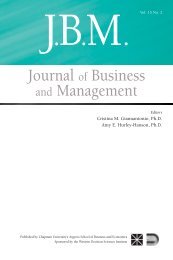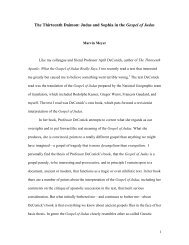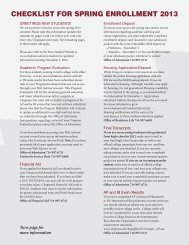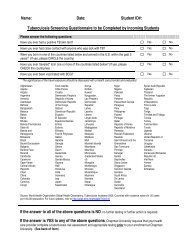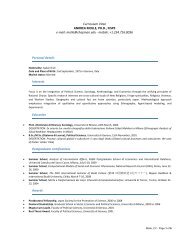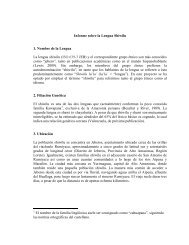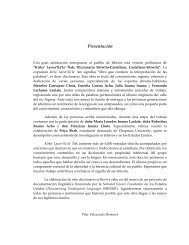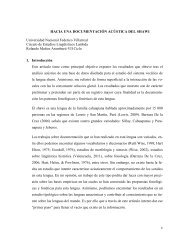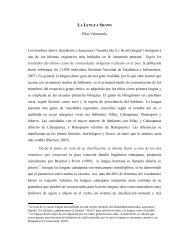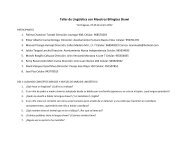“Surplus Humanity” and the Margins of Legality - Chapman University
“Surplus Humanity” and the Margins of Legality - Chapman University
“Surplus Humanity” and the Margins of Legality - Chapman University
Create successful ePaper yourself
Turn your PDF publications into a flip-book with our unique Google optimized e-Paper software.
Do Not Delete 12/12/2010 7:34 PM<br />
16 <strong>Chapman</strong> Law Review [Vol. 14:1<br />
agricultural labor in California, saturated by <strong>the</strong> instrumental<br />
use <strong>of</strong> race, class, <strong>and</strong> nationality in immigration <strong>and</strong> l<strong>and</strong>ownership<br />
laws that consolidated agro-capital, is also a story <strong>of</strong><br />
accumulation by dispossession. 105 Finally, trade regimes that<br />
entail ―neoliberal rescaling <strong>of</strong> governance to escape national-scale<br />
environmental constraints,‖ 106 <strong>and</strong> new appropriation <strong>of</strong> <strong>the</strong><br />
commons for private pr<strong>of</strong>it whereby ―<strong>the</strong> global commons are<br />
being enclosed,‖ 107 are instances <strong>of</strong> accumulation by dispossession.<br />
One specific result <strong>of</strong> accumulation by dispossession that is<br />
central to <strong>the</strong> production <strong>of</strong> slums is <strong>the</strong> emergence <strong>of</strong> a reserve<br />
army <strong>of</strong> labor. While dispossession destroys traditional<br />
entitlements <strong>and</strong> subsistence economies <strong>and</strong> estranges direct<br />
producers from <strong>the</strong>ir means <strong>of</strong> labor, all those dislocated are not<br />
absorbed in <strong>the</strong> new production process. 108 This unabsorbed<br />
labor may be ―free,‖ but it is suspended between <strong>the</strong> shrinking<br />
subsistence economy <strong>and</strong> <strong>the</strong> volatile formal markets. This<br />
unabsorbed labor is <strong>the</strong> so-called surplus humanity <strong>and</strong> includes:<br />
105 Agricultural employers ―used one group after ano<strong>the</strong>r, in a vast, repetitive cycle <strong>of</strong><br />
recruitment, employment, exploitation, <strong>and</strong> expulsion.‖ RICHARD A. WALKER, THE<br />
CONQUEST OF BREAD: 150 YEARS OF AGRIBUSINESS IN CALIFORNIA 66–74 (2004). Since<br />
<strong>the</strong> Civil War, California‘s agricultural labor was recycled <strong>and</strong> displaced with <strong>the</strong> bulk<br />
furnished serially by European immigrants, <strong>the</strong> Chinese, <strong>the</strong> Japanese, Filipinos,<br />
Mexicans, <strong>and</strong> undocumented workers. Id. The cycle <strong>of</strong> labor rotation prevented workers<br />
from securing better wages <strong>and</strong> more rights. The extra-economic measures to orchestrate<br />
this cycle included <strong>the</strong> Chinese Exclusion Acts <strong>of</strong> 1882, 1892, <strong>and</strong> 1902, <strong>the</strong> 1917<br />
Immigration Act, <strong>the</strong> bracero program, <strong>and</strong> <strong>the</strong> 1965 Immigration Reform Act. One<br />
should include here o<strong>the</strong>r extra-economic developments like breakdown <strong>of</strong> <strong>the</strong> late Q‘ing<br />
era regime in China, <strong>the</strong> U.S. colonization <strong>of</strong> <strong>the</strong> Philippines, <strong>and</strong> <strong>the</strong> Mexican Revolution.<br />
Id.<br />
106 James McCarthy, Privatizing Conditions <strong>of</strong> Production: Trade Agreements as<br />
Neoliberal Environmental Governance, 35 GEOFORUM 327, 330–32 (2004). McCarthy sees<br />
this as a reinforcement <strong>of</strong> <strong>the</strong> neoliberal ―regulatory takings‖ <strong>the</strong>sis ―that completely<br />
unencumbered, asocial private property is <strong>the</strong> norm <strong>and</strong> that <strong>the</strong> state must pay its<br />
citizens for any exercise <strong>of</strong> its governance powers.‖ Id. Legal regimes <strong>of</strong> agreements, such<br />
as NAFTA, inscribe private rights to surplus value by reinforcing public responsibility for<br />
externalities generated by private appropriation. Id. One specific instance is global legal<br />
regimes that force governments to reimburse capital interests for any costs that<br />
environmental protection legislation may entail. Id. In this schema, environmental<br />
protection is construed as a barrier to trade <strong>and</strong> penalized or struck down. Id.<br />
107 Hartsock, supra note 101, at 176. At play here is <strong>the</strong> enforcement <strong>of</strong> everexp<strong>and</strong>ing<br />
intellectual property rights, depletion <strong>of</strong> global environmental commons,<br />
privatization <strong>of</strong> public assets <strong>and</strong> services, <strong>and</strong> rollback <strong>of</strong> regulatory frameworks<br />
governing <strong>the</strong> commons. HARVEY, THE NEW IMPERIALISM, supra note 79, at 146–48.<br />
108 It is <strong>the</strong> foundation <strong>of</strong> Keynesian critique <strong>of</strong> classical economics that capitalism<br />
does not produce any automatic tendency toward full employment. See JOHN MAYNARD<br />
KEYNES, THE GENERAL THEORY OF EMPLOYMENT INTEREST AND MONEY (1936); Thomas I.<br />
Palley, From Keynesianism to Neoliberalism: Shifting Paradigms in Economics, in<br />
NEOLIBERALISM: A CRITICAL READER 20, 20–23 (Alfredo Saad-Filho & Deborah Johnston<br />
eds., 2005) [hereinafter Palley, From Keynesianism to Neoliberalism]; SKIDELSKY, supra<br />
note 14.



